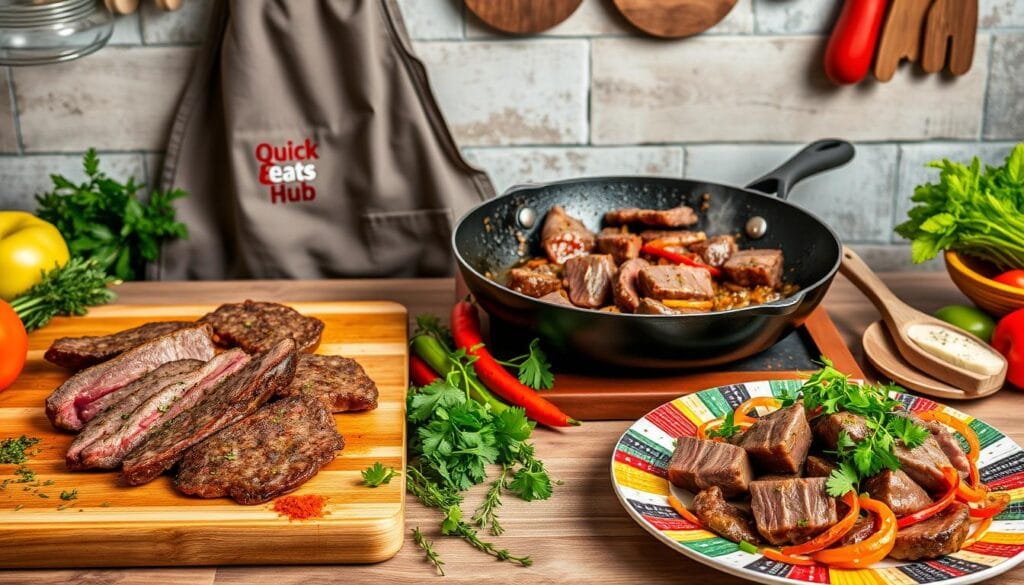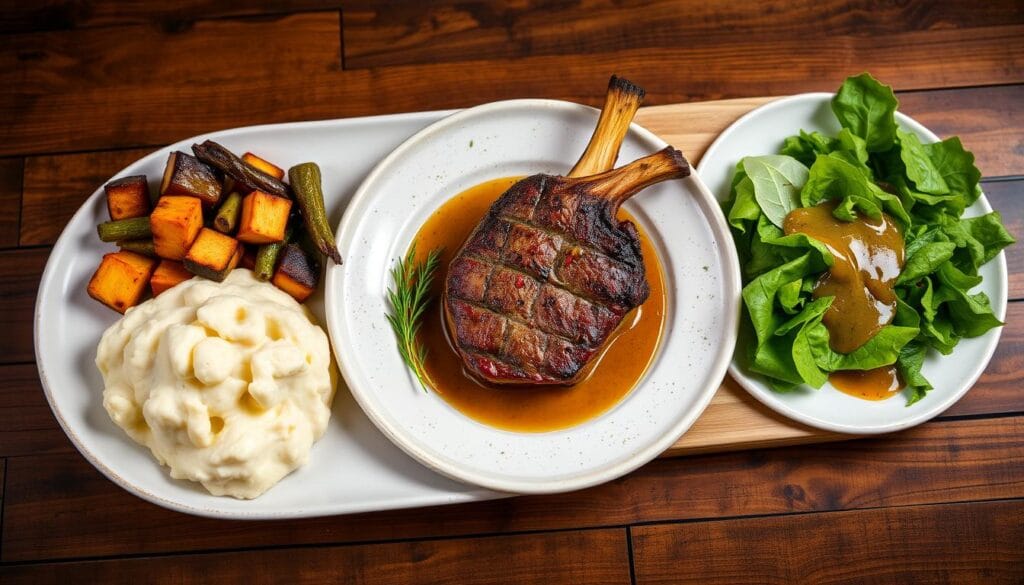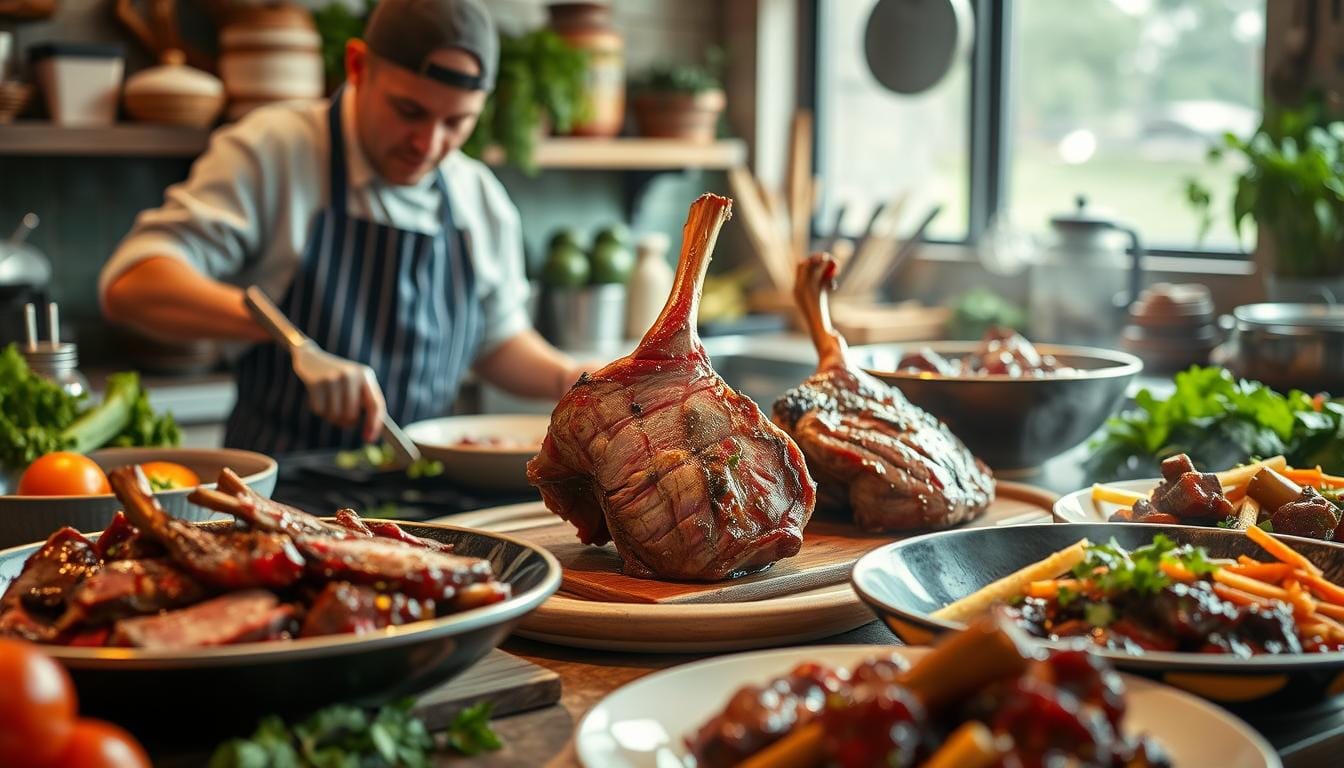Growing up, my family loved trying new foods. My grandmother first introduced me to beef heart. It was tender and rich, unlike the scary organ meat I thought it would be. Cooking beef heart can seem hard, but with the right steps, it becomes a tasty meal.
Learning to cook beef heart opens up new culinary adventures. It’s not just a fancy food but also full of nutrients like protein, iron, and B vitamins. Whether you’re a brave home cook or just want to try something new, beef heart recipes are a great way to discover new tastes and cooking ways.
Table of Contents
What is Beef Heart and Why Cook It?
Beef heart is a nutrient-rich organ meat that’s perfect for bold home cooks. It’s packed with essential nutrients, offering a unique flavor and nutritional boost. This makes it a great addition to your cooking collection.
Nutritional Powerhouse
Beef heart is a true superfood when it comes to nutrition. A single serving is loaded with:
- High-quality protein: 45g per serving
- Rich in iron: 12mg per serving
- Excellent source of B vitamins
- Contains beneficial omega-3 fatty acids
This makes beef heart a top choice for those looking for a protein-rich, nutrient-dense food. It’s low in fat and high in minerals, supporting health and wellness.
Flavor Profile and Texture
Beef heart has a robust, meaty flavor unlike traditional beef. Its texture is firmer than steak, providing a chewy experience when cooked right.
“Beef heart provides a rich, intense flavor that’s similar to a tender minute steak, but with a more distinctive character.” – Culinary Expert
| Nutrient | Amount per Serving |
|---|---|
| Calories | 359 kcal |
| Protein | 45g |
| Fat | 10g |
| Iron | 12mg |
| Potassium | 1466mg |
Cooking beef heart needs skill, but the result is a tasty, nutritious meal. Marinating for at least an hour can make it even better. It’s a fun ingredient to try in your kitchen.
Preparing Beef Heart for Cooking
Preparing beef heart needs careful steps and attention. This meat might seem tough, but with the right methods, it becomes a tasty and healthy meal.
Cleaning and Trimming the Heart
Begin by rinsing the beef heart under cold water. Then, dry it with paper towels to get rid of extra moisture. Trimming is crucial:
- Take off any fat and tough parts
- Cut the heart into slices that are 3-4 inches long
- Make sure slices are 2-3 inches wide for even cooking
“A well-trimmed beef heart is the foundation of a great meal” – Professional Chef
Marinating Options for Enhanced Flavor
Marinating beef heart can make it taste better and tenderize it. Here’s a simple marinade recipe:
| Ingredient | Quantity |
|---|---|
| Olive Oil | 3 TBSP |
| Minced Garlic | 3 cloves |
| Lemon Juice | 2 TBSP |
| Salt | To taste |
| Black Pepper | 1 tsp |
For more flavor, add spices like paprika, cumin, or chili powder. Let the beef heart marinate in the fridge for 1-3 hours. This will make it tender and taste better.
Remember, always cook beef heart to 160°F to ensure food safety. With good preparation and marinating, you’ll have a dish that’s delicious and can feed up to 8 people.
Cooking Methods for Beef Heart
Exploring different cooking techniques can turn beef heart into a tasty meal. Each method brings out unique flavors and textures. This makes beef heart a versatile and nutritious option for cooking.
Cooking beef heart requires the right techniques for tenderness and flavor. It’s important to avoid overcooking. This ensures the meat stays juicy and full of flavor.
Grilling: A Smoky Flavor Experience
Grilling beef heart adds a delicious smoky taste that many enjoy. Here are some tips for grilling beef heart:
- Preheat the grill to high heat (around 450-500°F)
- Cut beef heart into 1/2 inch thick strips
- Cook for 2-3 minutes per side for medium-rare
- Use avocado or olive oil for marinating
Braising: Slow-Cooked Tenderness
Braising beef heart makes it tender and delicious. The slow-cooking method breaks down tough fibers. This results in a tender and flavorful dish.
| Cooking Method | Time | Temperature |
|---|---|---|
| Slow Cooker | 4-6 hours | High |
| Instant Pot | 70 minutes | High Pressure |
Sautéing: Quick and Flavorful
Sautéing beef heart is great for a quick meal. Slice the heart thinly and cook in a hot pan with oil. This brings out the best flavors.
“The secret to tender beef heart is not overcooking and allowing it to rest after cooking.” – Professional Chef
Pro tip: Always marinate beef heart for at least an hour before cooking. This enhances tenderness and flavor. Whether you grill, braise, or sauté, beef heart can be a tasty and healthy part of your meal.
Beef Heart Recipes to Try
Exploring unique beef heart recipes can turn this nutrient-dense organ meat into tasty dishes. These recipes are perfect for adventurous cooks or those looking to improve their skills. They will help you master the art of preparing beef heart.

Spicy Beef Heart Tacos
Beef heart tacos add a spicy twist to taco night. Start by trimming the beef heart and slicing it into thin strips. Use a robust marinade made of:
- 2 tablespoons chili powder
- 1 teaspoon cumin
- 2 minced garlic cloves
- Lime juice
- Salt and pepper
Marinate the beef heart strips for at least 1 hour. Grill or sear quickly in a hot skillet for 2-3 minutes per side. Serve in warm tortillas with fresh salsa and cilantro.
Beef Heart Stew for Comfort Food Lovers
A hearty beef heart stew turns this organ meat into a rich, warming meal. Here’s a quick breakdown of ingredients:
| Ingredient | Quantity |
|---|---|
| Beef heart | 2 lbs, cubed |
| Onion | 1 large, chopped |
| Carrots | 3, sliced |
| Beef broth | 1 cup |
Slow cook the beef heart stew for 4-6 hours until the meat becomes tender and flavorful. This protein-packed meal is perfect for cold days.
Grilled Beef Heart Skewers
Beef heart skewers are a fantastic way to enjoy this lean protein. Cut the heart into 1-inch cubes and marinate for an hour. Thread onto skewers with vegetables like bell peppers and onions. Grill for 2-3 minutes per side, creating a delightful charred exterior.
“Cooking beef heart is an adventure in flavor and nutrition!” – Culinary Explorers
Pro tip: Let the beef heart rest for a few minutes after cooking to retain its juiciness. These recipes can be stored in the refrigerator for up to 4 days or frozen for 3 months.
Important Cooking Tips for Beef Heart
Cooking beef heart needs precision and care. It’s about finding the right balance of flavor and tenderness. Knowing the right techniques can turn this meat into a dish that’s both surprising and delightful.
Mastering Beef Heart Doneness
Getting the right doneness is key for a great dish. Here are some temperature guidelines:
- Medium-rare: 135°F (57°C)
- Medium: 145°F (63°C)
- Medium-well: 150°F (66°C)
Experts say cooking beef heart to medium-rare is best. It keeps the meat tender and flavorful. A meat thermometer is a must for accurate temperatures.
The Art of Resting Beef Heart
Resting the beef heart is a step many miss. After cooking, let it rest for 5-10 minutes. This pause helps juices spread evenly, making each bite juicy and full of flavor.
“Patience transforms a good meal into an extraordinary dining experience.” – Culinary Wisdom
| Cooking Method | Recommended Temperature | Resting Time |
|---|---|---|
| Grilling | 135-145°F | 5-7 minutes |
| Braising | 145-155°F | 7-10 minutes |
| Sautéing | 130-140°F | 3-5 minutes |
Remember, grass-fed beef heart might need slightly different cooking times. It’s leaner, so watch it closely. Use your senses to check if it’s done right.
Serving Suggestions for Beef Heart Dishes
Exploring the right beef heart side dishes can make your meal special. Beef heart has a strong flavor that goes well with many foods. Knowing how to match it can turn your meal into something amazing.
Pairing with Vegetables
Choosing vegetables for beef heart is key. Look for ones that balance its bold taste. Root vegetables are great, adding a hearty touch.
- Roasted carrots with herbs
- Caramelized parsnips
- Sautéed spinach with garlic
- Roasted sweet potatoes

Best Sides to Complement Beef Heart
Choosing the right sides for beef heart is important. The right dishes can make the meat’s flavor even better and add more nutrients.
| Side Dish Category | Recommended Options | Preparation Time |
|---|---|---|
| Grains | Quinoa, Brown Rice, Couscous | 15-20 minutes |
| Starches | Mashed Potatoes, Roasted Fingerling Potatoes | 25-30 minutes |
| Green Vegetables | Kale, Swiss Chard, Broccoli Rabe | 10-15 minutes |
“The secret to a perfect beef heart dish lies in its accompaniments.” – Chef’s Culinary Wisdom
Pro tip: Let your beef heart rest for 5-10 minutes after cooking. This makes it tender and juicy.
Beef heart is very healthy. A 3-ounce serving has about 24.2 grams of protein. It’s also full of iron, selenium, and B vitamins. Pairing it with healthy veggies and grains makes a meal that’s tasty and good for you.
Storing Leftover Beef Heart
Enjoying a tasty beef heart meal is great. But, knowing how to store and reheat it is even better. This way, you can keep its flavor and texture just right.
Cooling and Refrigeration Tips
Here are some key tips for storing beef heart:
- Let cooked beef heart cool to room temperature in 2 hours
- Use airtight containers to keep it fresh
- Put it in the fridge right after cooling
- Eat it within 3-4 days for the best taste
“Proper storage is key to maintaining the rich flavor and nutritional value of beef heart.”
Reheating Leftovers Safely
Reheating beef heart needs gentle care to keep it moist. Here’s how to do it right:
- Use a pan with a tight-fitting lid
- Add a bit of broth or gravy to keep it moist
- Heat it over medium-low
- Stir it now and then to heat evenly
- Make sure it reaches 165°F for safety
Pro tip: Avoid microwave reheating, as it can quickly dry out the meat and compromise its tender texture.
By using these storing and reheating tips, your beef heart will stay delicious and safe to eat.
Common Mistakes When Cooking Beef Heart
Cooking beef heart can be tricky. Many home chefs make mistakes that ruin the meat’s quality. Knowing these mistakes helps you make a delicious, tender dish every time.
Professional chefs say overcooking beef heart is a big mistake. This lean protein gets tough if cooked too long. It’s important to keep the cooking temperature right and check the meat’s doneness carefully.
Avoiding Overcooking Beef Heart
Overcooking beef heart makes it rubbery and unappetizing. To avoid this, follow these tips:
- Cook to medium-rare or medium doneness
- Use a meat thermometer for accuracy
- Remove from heat when internal temperature reaches 135-145°F
- Let the meat rest for 5-7 minutes after cooking
The Importance of Marinating
Not marinating is another big mistake. Marinating adds flavor and tenderizes the meat. A good marinade can make this organ meat delicious.
| Marinating Solution | Purpose | Recommended Duration |
|---|---|---|
| Buttermilk | Breaks down muscle fibers | 1-2 hours |
| Vinegar-based marinade | Tenderizes and adds depth | 30-45 minutes |
| Red wine mixture | Adds rich flavor | 45-60 minutes |
Remember: A good marinade can turn a potentially tough cut into a restaurant-quality meal.
By avoiding these common mistakes, you’ll improve your cooking skills. You’ll make a memorable, flavorful dish that will impress your guests.
Frequently Asked Questions About Beef Heart
Exploring beef heart can be intimidating for many home cooks. Understanding its unique characteristics helps you confidently prepare this nutrient-dense meat in your kitchen.
How Beef Heart Compares to Other Cuts of Meat
When comparing beef heart to other meats, it stands out. It’s lean and full of nutrients. It has more iron, zinc, and B vitamins than muscle meats.
| Meat Cut | Protein (g) | Iron Content | Fat Percentage |
|---|---|---|---|
| Beef Heart | 22.5 | High | 5-7% |
| Ribeye Steak | 18 | Medium | 15-20% |
| Chicken Breast | 20 | Low | 3-4% |
Substituting Beef Heart in Recipes
Substituting beef heart in recipes needs creativity. It’s great in dishes that use stew meat or lean beef. Here are some tips:
- Trim excess connective tissue before cooking
- Marinate to enhance tenderness
- Adjust cooking times for optimal texture
“Beef heart is nature’s multivitamin disguised as meat!” – Chef Michael Roberts
For best results, experiment with different cooking methods like slow-cooking or pressure cooking. This will help you get the most flavor and tenderness.
Pro tip: Cook beef heart to an internal temperature of 140°F for medium doneness, ensuring a juicy and flavorful meal.
Final Thoughts on Cooking Beef Heart
Exploring beef heart cooking techniques opens a world of tasty and healthy dishes for bold home cooks. It’s not scary to try beef heart—it’s a chance to grow your cooking skills and eat better.
Beef heart cooking can be both fun and easy. The secret is to be bold and creative with this special ingredient. Here are some tips for cooking beef heart well:
- Start with simple recipes to build your confidence
- Choose high-quality grass-fed beef heart for the best nutrition
- Learn how to prepare it right for tenderness
- Feel free to try out different marinades and spices
“Cooking is about passion, so don’t be afraid to experiment with new ingredients like beef heart.” – Professional Chef
Beef heart is super good for you, packed with B vitamins, CoQ10, and minerals. Quick searing and proper marination help make it tender and tasty.
Embrace Culinary Creativity
Getting good at cooking beef heart takes time. Every try makes you better and wiser about this unique meat. Whether it’s tacos, stews, or skewers, dive into each recipe with excitement and a willingness to learn.
Resources for Further Reading on Beef Heart
Exploring beef heart cookbooks and online communities can greatly improve your cooking with this meat. Home cooks and food lovers have created many resources. They help you learn to cook beef offal recipes and grow your cooking skills.
Online Communities and Forums
Online platforms are great for cooks who dare to try new things. The Weston A. Price Foundation has lots of research and practical tips. It’s all about traditional food preparation.
Reddit’s r/Charcuterie and food forums are also great. They connect you with butchers, chefs, and home cooks. They share tips on choosing, preparing, and cooking beef heart.
Learning to cook beef heart is a journey. Local butchers, farmers markets, and cooking classes offer hands-on learning. They help you get better at using this amazing ingredient.
FAQ
Is beef heart safe to eat?
How do I remove the tough membranes from beef heart?
Can I freeze beef heart?
What does beef heart taste like?
Is beef heart good for you?
What are the best cooking methods for beef heart?
How long should I marinate beef heart?
Can I use beef heart in tacos or stews?
How do I prevent beef heart from becoming tough?
There are no reviews yet. Be the first one to write one.

